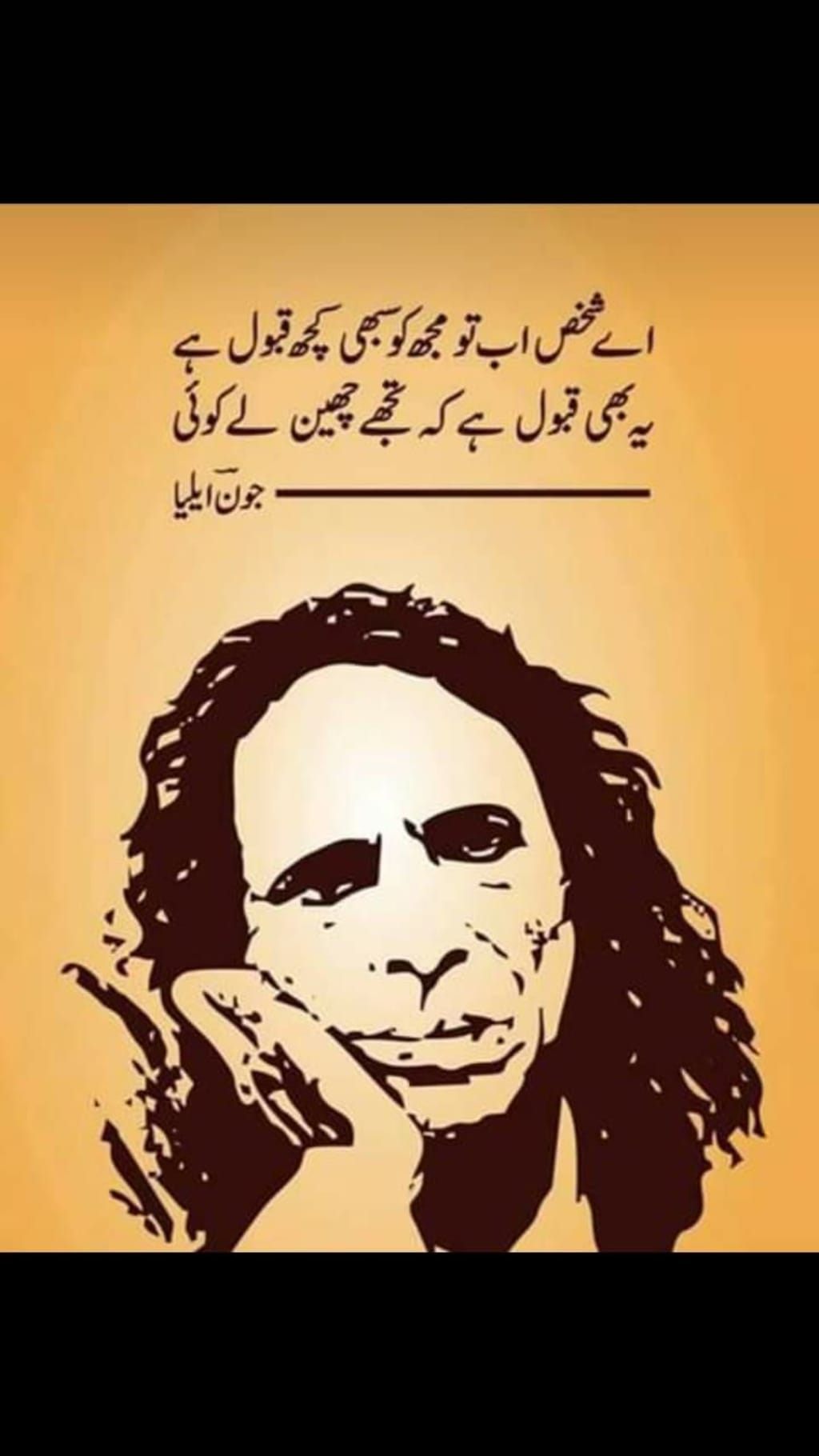Jaun Elia
The Poet of Raw Emotions and Profound Reflections

Introduction:
Jaun Elia, born Syed Sibt-e-Asghar Naqvi, was a remarkable Urdu poet, philosopher, and scholar whose verses continue to captivate readers even years after his demise. His unique style, characterized by profound reflection, intense emotions, and an unabashed honesty, established him as one of the most revered poets of the 20th century. Through his poetry, Elia explored the depths of human experiences, delving into themes such as love, loss, existentialism, and the complexities of life. This article aims to shed light on the life, works, and enduring legacy of this literary maestro.
Early Life and Education:
Jaun Elia was born on December 14, 1931, in Amroha, Uttar Pradesh, British India. He hailed from a distinguished literary family, with his father, Shafiq Hasan Elia, and brother, Rais Amrohvi, being renowned Urdu poets. Elia's family later migrated to Pakistan after the partition of India in 1947. Elia completed his early education in Amroha and obtained a Master's degree in Urdu literature from the University of Karachi.
Literary Career and Style:
Elia's literary career spanned several decades, during which he wrote poetry, translated works, and contributed to various literary journals. He was deeply influenced by the works of renowned Persian poets such as Mirza Ghalib and Iqbal, as well as Western existentialist philosophers like Friedrich Nietzsche and Jean-Paul Sartre. This amalgamation of influences gave birth to Elia's unique poetic style.
Elia's poetry was characterized by its raw emotional intensity and a deep understanding of the human condition. He fearlessly explored themes like unrequited love, existential angst, and the futility of life. His verses often presented a stark contrast between the grandeur of poetic imagery and the harsh realities of the world. Elia's poems were marked by an unapologetic authenticity that resonated deeply with readers, evoking a sense of introspection and catharsis.
Major Works:
Jaun Elia published several poetry collections throughout his career. His notable works include "Shayad" (Perhaps), "Ya'ani" (That Is to Say), "Gumaan" (Doubt), and "Lekin" (But). These collections garnered critical acclaim and cemented his position as a prominent voice in Urdu literature. Elia's poetry stood out for its ability to communicate complex emotions and philosophical ideas through simple yet profound language.
Elia's Poetry and Themes:
One of the defining characteristics of Elia's poetry was its relentless exploration of the human experience. His verses delved into the depths of love, longing, despair, and the inevitability of death. Elia's words often captured the complexities of relationships, the pain of unrequited love, and the haunting beauty of memories. His poems were a testament to the universality of human emotions, touching the hearts of readers from all walks of life.
In addition to exploring matters of the heart, Elia's poetry also addressed existential questions. He contemplated the purpose of life, the transient nature of worldly pursuits, and the search for meaning in an unpredictable world. Through his verses, Elia challenged societal norms, advocated for individual freedom, and encouraged readers to question the status quo.
Legacy and Impact:
Jaun Elia's profound impact on Urdu literature is undeniable. His poetry continues to inspire generations of readers, transcending boundaries of language and culture. Elia's ability to articulate complex emotions and philosophical ideas in accessible language has made his works relatable and timeless. He brought a refreshing honesty and vulnerability to his poetry, which resonated deeply with those seeking solace and understanding in the face of life's challenges.
Elia's influence extends beyond poetry; he was also a renowned translator, known for his translations of Russian, Turkish, and Arabic works into Urdu. His translations helped introduce the works of international literary giants to Urdu-speaking audiences.
Conclusion:
Jaun Elia's contributions to Urdu literature are unparalleled. His poetry, characterized by its raw emotions, profound reflections, and existential inquiry, continues to leave an indelible mark on readers. Elia's ability to evoke intense emotions, coupled with his unapologetic honesty, makes him a poet whose words transcend time and language. His legacy as a literary maestro and philosopher remains intact, ensuring that future generations will continue to seek solace and inspiration in his extraordinary works.
About the Creator
Muqadas baloch
I am article writer and I am from pakistan subscribe me to keep updated from my newest stories.






Comments
There are no comments for this story
Be the first to respond and start the conversation.